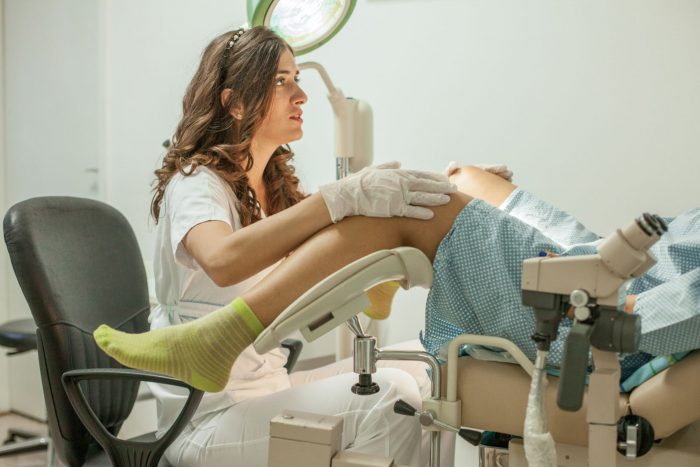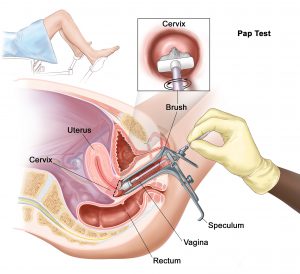
A Pap smear (aka. Pap test) is a screening test for women to check for signs of cervical cancer.
To perform the test, a doctor will usually take a sample of a woman’s cervical cells and study them in a laboratory to check for abnormal cellular growth. Cervical cells are found in the cervix of a woman. The cervix is at the lower end of the uterus, which is also at the upper area of the vagina.
Women should get Pap tests early and frequently to look for the early signs of cervical cell growth abnormalities before they worsen. Abnormal cervical cells do not automatically mean you have cervical cancer, but they are an early indicator of the likelihood of cervical cancer growth in the future.
Early detection of cervical cell growth will allow you and your doctor to treat the problem before the cells grow further and develop into cancer.
When to Get the Pap Test
Health professionals recommend women between the ages of 21 and 65 get the Pap smear test every three years. However, they also suggest women 30 and over could get the Pap smear test every five years, but only if they get the HPV test simultaneously. Some doctors even recommend prioritizing the HPV test over the Pap test if you have to choose one or the other.
Women of all ages with specific risk factors should consider getting the Pap smear test more frequently. The specific risk factors include the following:
- Infected with HIV
- Active sex life with multiple sexual partners
- Exposed to diethylstilbesterol (DES) before they were born
- A Pap smear screening detecting precancerous cells in the cervix
- A cervical cancer diagnosis
- A weak immune system from frequent corticosteroid use, an organ transplant procedure, or chemotherapy
- Past smoking habits
If any of these risk factors apply to you, you must consult your primary care physician regarding how frequently you should get Pap smear testing.
Will it Ever Be Safe to Stop Getting Pap Smear Tests?
In some circumstances, a doctor may advise a woman to stop getting Pap testing. These circumstances may include any of the following:
- A woman undergoes a total hysterectomy procedure to treat a noncancerous condition. A hysterectomy is where a doctor surgically removes the woman’s uterus and cervix.
- A woman turns 65 with a history of negative Pap smear test results. Her doctor may feel she doesn’t have to continue getting pap smear testing after reaching this point in her life.
Your doctor will weigh your specific risk factors to determine if it is safe for you to stop getting Pap smear testing.
Are Pap Smear Tests 100% Accurate?
Pap smear testing is one of the safest and most reliable ways to screen for signs of cervical cancer. Unfortunately, the test results are not 100% accurate or foolproof because false-negative results are still possible.
False-negative results mean the testing could show no abnormalities, despite abnormal cells existing in the cervix. The possible reasons for receiving false-negative results are if the cervical cell samples were collected incorrectly or the abnormal cells have inflammation or blood affecting them.
This is one more reason to get tested frequently. Since cervical cancer takes many years to grow, a second or third Pap smear test will likely detect it if the first test fails to do so.
What to Expect from the Pap Smear Test Procedure
Your doctor will advise you to avoid sexual intercourse, vaginal medicines, spermicidal topicals, and douching for at least two days before getting the Pap smear test. They will also recommend not to schedule your test around your expected menstrual period.

You should not feel any pain during this procedure. The worst you will feel is some pressure on your pelvic area, but that is all. Once the doctor finishes the procedure, you can leave the doctor’s office without needing any recovery time. Now all you must do is wait for your doctor to send your cervical cell sample to a laboratory for a closer examination under a microscope. If abnormalities in the cervical cells are detected, it could be a precancer warning sign.
Your doctor will take to you about your test results in greater detail. From there, they will advise you on treatment options and when to get your next Pap smear test.
About Abnormal Pap Smear Test Results
If the Pap smear detected abnormal cervical cells in your cervix, it does not mean you have cervical cancer.
Your doctor will probably recommend you undergo a colposcopy procedure so they can examine your vulval, cervical, and vaginal tissues with a magnifying instrument called a colposcope. Sometimes a biopsy procedure may follow as well.
The purpose of these procedures is to figure out the type of abnormal cervical cells you have and their level of seriousness.






